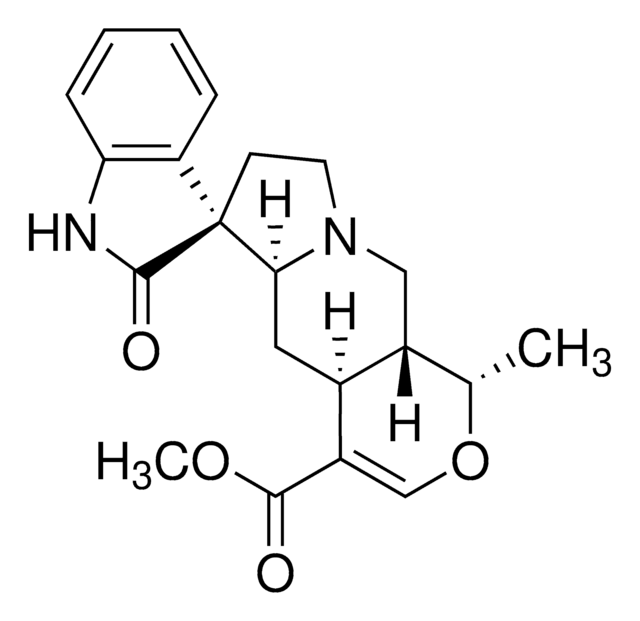T65404
2,4,6-Trihydroxybenzaldehyde
≥97%
Synonym(s):
Formylphloroglucinol, NSC 38610, Phloroglucinaldehyde, Phloroglucinolcarboxaldehyde
Sign Into View Organizational & Contract Pricing
All Photos(1)
About This Item
Linear Formula:
(HO)3C6H2CHO
CAS Number:
Molecular Weight:
154.12
Beilstein:
2254429
EC Number:
MDL number:
UNSPSC Code:
12352100
PubChem Substance ID:
NACRES:
NA.22
Recommended Products
Quality Level
Assay
≥97%
mp
195 °C (dec.) (lit.)
SMILES string
[H]C(=O)c1c(O)cc(O)cc1O
InChI
1S/C7H6O4/c8-3-5-6(10)1-4(9)2-7(5)11/h1-3,9-11H
InChI key
BTQAJGSMXCDDAJ-UHFFFAOYSA-N
Looking for similar products? Visit Product Comparison Guide
Application
Reactant involved in the synthesis of biologically active molecules including:
- 2,4,6-trichlorophenyl hydrazones with potential inhibition of protein glycation
- Esculentoside A derivatives with haemolytic activity and LPS-induced nitric oxide production inhibition
- α-Nucleophiles for hydrolysis of organophosphorus nerve agents
- Xanthine oxidase inhibitors
- Non-complexes Schiff base hydrazones
- Methylated (±)-epigallocatechin gallate library for anticancer activity studies
Signal Word
Warning
Hazard Statements
Precautionary Statements
Hazard Classifications
Eye Irrit. 2 - Skin Irrit. 2 - STOT SE 3
Target Organs
Respiratory system
Storage Class Code
11 - Combustible Solids
WGK
WGK 2
Flash Point(F)
Not applicable
Flash Point(C)
Not applicable
Personal Protective Equipment
dust mask type N95 (US), Eyeshields, Gloves
Choose from one of the most recent versions:
Already Own This Product?
Find documentation for the products that you have recently purchased in the Document Library.
Customers Also Viewed
Annelie Damerau et al.
Food chemistry, 332, 127385-127385 (2020-07-06)
A promising way of processing Baltic herring, Clupea harengus membras, is turning the fish into boneless mince. However, Baltic herring is prone to lipid oxidation, which possesses a challenge for industrial applications. The aim of this work was to study
Vicente Agulló et al.
Nutrients, 13(2) (2021-01-28)
The intake of sugar-sweetened beverages has been associated with an augmented prevalence of metabolic diseases, namely, obesity, type II diabetes, and metabolic syndrome. On the other hand, nowadays, it is broadly accepted that foods and beverages rich in (poly)phenols could
Anna Vallverdú-Queralt et al.
Food chemistry, 199, 902-910 (2016-01-19)
In red and rosé wines, the grape anthocyanins are progressively converted to more stable pigments, including phenylpyranoanthocyanins. One-/two-dimensional NMR and UPLC-DAD-ESI-MS(n) measurements were used to monitor the synthesis of guaiacylpyranomalvidin 3-O-glucoside from malvidin 3-O-glucoside and vinylguaiacol in model solutions and
Annamária Marton et al.
Anticancer research, 36(11), 5743-5750 (2016-10-30)
Constitutive activation of nuclear factor kappa-B (NFĸB) is a hallmark of various cancer types, including melanoma. Chemotherapy may further increase tumour NFĸB activity, a phenomenon that, in turn, exacerbates drug resistance. This study aimed at preliminary screening of a panel
Zuzana Racova et al.
The Journal of nutritional biochemistry, 85, 108482-108482 (2020-08-18)
Flavonoids, including anthocyanins, are polyphenolic compounds present in fruits, vegetables and dietary supplements. They can be absorbed from the intestine to the bloodstream or pass into the large intestine. Various bacterial species and enzymes are present along the entire intestine.
Our team of scientists has experience in all areas of research including Life Science, Material Science, Chemical Synthesis, Chromatography, Analytical and many others.
Contact Technical Service









